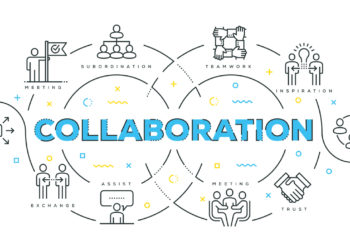Scholarly communications — like the wider world — is increasingly divided. The rhetoric around non-profit versus commercial organizations, open versus subscription models, publishers versus librarians, is often presented in a very black and white, good versus bad way. Yet we all have the same ultimate goal – to support research and researchers. So why don’t we collaborate more (like our researchers do), and argue less (like our much mistrusted politicians)? Why don’t we focus more on what we have in common, and less on where we differ? Why don’t we define ourselves more as “we” and less as “them and us”? Why don’t we put more effort into being better together?

Whichever way you look at it, we live in an increasingly divided world. Encouraged by many of our political (and other) leaders, partisanship has become the norm; mistrust is rife; and our differences are prioritized over what we have in common. And yet, and yet… Despite the skepticism of an alarming number of politicians and others, public trust in science is, at worst, stable; at best, growing. A recent report shows that the level of trust on individual topics may vary by demographic (e.g., ideology and age for climate change; race/ethnicity for childhood vaccines), as may the overall level of trust in science and scientists (just 52% of those without a high school diploma say the benefits of scientific research outweigh the harmful results, compared with 94% of those with a graduate degree or beyond). But even so, the vast majority of people in the US (76%) trust scientists more than they trust almost any other group according to this recent Pew survey — and substantially more than they trust elected officials — including, yes, those who are trying to persuade us to ignore what those scientists are saying (27%)! According to the 2017 Ipsos MORI Veracity Index, this is even more the case in the UK, with 83% saying they trust scientists and just 17% trusting politicians.
Research, of course, is built on collaboration, which is itself built on trust. Standing on the shoulders of giants and building on their efforts; working in (often global and/or cross-disciplinary) teams; sharing research results with peers, inviting their feedback, and refining work accordingly — all are central to science and scholarship.
Likewise, scholarly communications is at its best when we work together. As Kristen Fisher Ratan of the Collaborative Knowledge Foundation said in her inspirational keynote at last month’s FORCE2018 conference, it’s time for us to stop squabbling and start collaborating to make research more effective. The recently published UN special report on climate change and dire warnings from their biodiversity chief make it abundantly clear that, if humans have any hope of surviving, we need to take action — and we need to do so now. We can’t afford to waste any more time focusing on our differences, we need to find our common causes and focus on making (rapid) progress with them.
Supporting researchers — making them the center of all we do — is the key goal for everyone working in scholarly communications. This includes helping our researchers get funding, identify potential collaborators, analyze their data, present their findings, publish the results, to name just a few. So let’s find common cause in delivering what they want most — more time to carry out their research, and the recognition they need for their research to be adequately resourced.
According to this Nature survey, on average researchers spend more than a quarter of their time on administration — data storage (5%), writing grant applications (10%), and other tasks (11%). That’s almost half the amount of time they spend actually doing and writing up their research (38% and 16% respectively). Imagine how much more research could be carried out — faster — if we could halve the time spent on admin tasks, by improving the research infrastructure and making it easier for researchers and their organizations to share and reuse information and resources.
I believe this could be achievable — and quickly — because so many of the building blocks are already in place. We have the makings of a strong research infrastructure, powered by persistent identifiers (PIDs), standards, and metadata. But development and, in particular, widespread adoption of these is often painfully slow. New standards typically take years to define and then years more to implement. Metadata is only just starting to get the attention it needs, and deserves, through initiatives like Metadata 2020. And PIDs, though more widely used than ever before, are still not the norm everywhere — and are still not being used to their full advantage.
To harness the power of the research infrastructure we need the community to make these building blocks a priority. To use my own organization (ORCID) as an example, although there are now over 5.5m ORCID identifiers for researchers, only about 40% of those have any items of information connected to them. Only about a quarter of contain information about works — although those that do, include a lot (35m in total, and close to 14m unique DOIs). If more of these records were better populated — by funders, employers, publishers, associations, and by the researchers themselves — that information would be openly available (with the researcher’s permission) for everyone to access, use, and share. There’s plenty more that we at ORCID can and must do to make our technology easier and more accessible for the community. But we won’t succeed without community support for implementing ORCID in your own systems, connecting the trusted information you have about your researchers, and encouraging them to use their iD and share it with their other organizations.
But it doesn’t stop there. We also need to get smarter about developing tools and services that harness the power of the research infrastructure, to make researchers lives easier, and help them get the credit they need and deserve (for example, for peer review). There’s no shortage of ideas — we have legions of innovators and innovations, tools and services, many developed by researchers, to help fix the problems they’ve personally experienced. But this brings its own challenges. We risk confusing and frustrating researchers by giving them such a vast array of options. Bianca Kramer and Jeroen Bosman maintain a (frankly scary!) list of close to 700 (and growing!) online innovations and tools for researchers. It’s great that so many people and organizations are putting such effort into supporting researchers in this way, but I can’t help thinking that there’s an awful lot of overlap between many of them. If we focused the development of our new tools and services more on the common needs of researchers and less on the unique needs of specific research communities, surely we could make more progress, more quickly — the 80/20 rule at work…
There are many other areas of common cause, of course, so let’s spend more collaborating on them. Let’s lead by example. Let’s be better together!
Discussion
23 Thoughts on "Better Together"
Great post, Alice. You mentioned the huge list of innovations in some form of development that aid researchers. I think the problems you mention needs to be addressed with money—but where to find it? Innovations developed by frustrated researchers as a side project don’t get funded. There is little to no interest from investors in these tools because they aren’t going to make enough money.
How many times do we see a lightning round session at a conference of some new tools to help our author audience and 6 out of 7 of them have no sustainable business model. Or, the business model is to charge the publishers for allowing their readers to use the tool. It’s not going to come from publishers like mine. Societies that “partner” with an innovator and pay for significant development are likely to want to keep those developments as “member only” services as we all chase the golden key.
ORCID is a great example of the long slog to make it from idea to a reality. And it required immediate and sustained publisher funding and full time staff. Publishers funded it (and still become members) because it’s not a researcher tool. Its infrastructure for all of it.
We need more initiatives like the Digital Science Grants that provide some start up funds and mentoring to these innovators. And the innovators need to be willing to learn why it’s important to integrate in established systems and then make it so. The only other alternative is to wait for a commercial publisher to offer it.
Love this piece, Alice, thanks. I would echo your call for less division and more collaboration. And nevermind information overload, agree there is for sure tool overload. I think a lot of it comes down to trust, and trust can come through a combination of transparency, sustainability, and governance. The more some of these tools go open source (so are forkable if they “turn evil”), get long-term backing, and broaden governance, the more we’ll see a real willingness to work together, and the closer we’ll be to the truly cohesive system you envisage. As you know, it’s never really a technology challenge but usually a social one 😉
Thanks both!
Angela you’re right about the money – my thinking is that we could do this by focusing on developing fewer but better products. So putting the same amount of money into doing less better…
Ginny – YES! – it’s a primarily a social issue and the move toward more open source is definitely a good thing. But it needs to happen faster and that means doing a better job of acknowledging organizations that are making the effort to change.
Your post certainly hits home with me, particularly the opening paragraph.
At the American Anthropological Association, we’re working to develop a discipline-wide, global, open access repository for preprints, conference papers, datasets and other materials. The goal is to promote access to scholarly research and anthropological knowledge produced by anthropologists anywhere, regardless of where they’re located or how well-endowed their home institution–if they have one–may be.
We’re contracting with a commercial entity (Atypon, using Literatum) to develop the platform, and have run into a storm of complaints. That decision wasn’t taken lightly–we reviewed commercial and non-commercial providers, and in the end chose this route because it allowed us to create a more robust and user-friendly platform more quickly and at lower cost, both in terms of initial costs and long-term support and maintenance, and thereby disseminate knowledge and inform subsequent research sooner rather than later. We, the community, retain control of the content and the metadata, and we can move to another platform if and when alternative platforms become more viable.
Open source platforms are attractive but require significant investment to be sustainable and successful (LOCKSS is an obvious example). And purely academic partners are attractive because they have parallel missions, at least ostensibly, but are rarely in a position to make long-term commitments of the funds and expertise needed for repositories of this kind, absent some other source of funding or immediate benefit. So partnerships with a broader range of entities to achieve worthwhile purposes, without sacrificing control of the content or the metadata or work with other partners in the future, seemed like the best (and least-worst) choice.
But you certainly need to have the courage of your convictions.
Thanks for sharing your experience Alex – I agree that deciding who to partner with based simply on their for/not for profit basis doesn’t make sense. Having said that there are a number of for profit companies that make some of their code available open source (eg Ringgold), which has got to be a step in the right direction.
I don’t believe there is one single solution to best support researchers in their needs. There are different needs (by disciplines, personal preferences, etc), so one size (or two or ten) won’t fit. In what direction would collaboration then be helpful?
There seems to be a need for the many innovative tools and services that have shaped over the years. I am currently doing market research into startups in research workflows and science communication (launch dates: 2007-2017) and preliminary results show that the majority is still around in 2018.
I agree with Angela that ‘…the innovators need to… integrate in established systems…’ And equally so do the established systems need to enable integration of the innovative tools. Provided one is aiming to truly support research and researchers, choice, and therefore modular/interoperable services (multiple suppliers, partial solutions) are the way to go. I believe this, but let’s have the community we’re serving lead us.
Thanks Yvonne. I’m a great believer that one size doesn’t fit all, however, I’m not convinced that this means coming up with a unique solution for every single user’s needs. The modular/interoperable approach is definitely the way to go!
Money makes the world go around
The world go around
The world go around
Money makes the world go around
It makes the world go ’round.
A mark, a yen, a buck, or a pound
A buck or a pound
A buck or a pound
Is all that makes the world go around,
That clinking clanking sound
Can make the world go ’round.
Money money money money money money
Money money money money money money
Money money money money money money
Money money
Read more: Cabaret – Money Lyrics | MetroLyrics
Hi Alice, You had me at “we” as a longtime believer and enabler of the WEconomy and now the coming age of interdependency. I think you sum it up nicely with these statements “Why don’t we focus more on what we have in common, and less on where we differ? Why don’t we define ourselves more as “we” and less as “them and us”? Why don’t we put more effort into being better together?”.
I see so many companies, leaders and services focused on their differentiators. As a long time creative marketing professional, I certainly understand the power of differentiation. Today the truly superior companies – if any exist – are going to do what I did for HP decades ago; pay more attention to values across their internal and external ecosystem with emphasis on what more of us share. I was proud to be a catalyst to earning trust, credibility and relevance and using inclusion and idea diversity to enable and inspire the best from global teams. In order to do so – as one who was a designer moving into a new realm of conscious design – I had to leave my designer comfort zones and immerse myself into customer facing environments (sales, channels, events) and then customer influencer environments (analysts, media, editors, customer champions). Getting away from the closed internal environs that our HP sales team often referred to as “Factory Pukes” and investing in others across what now clearly is the success ecosystem for any company, revealed a wealth of opportunities for creativity, greater meaning, inclusion and near contagious enthusiasm for everything we did “together”.
The sad part is how even a once great company like HP failed to invest to understand how we were exceeding all interpretations of success as in doing so, it was repeatable. They saw the huge revenue spikes but did not pass that along to the teams that made it happen. I saw people I cared about suddenly infused with energy and capacity to make a difference. Today, as Gallup reports 70% of global employees are emotionally disconnected from work, it’s clear that I had the right value compass and applying the principles we used is even more urgent today. It was also clear that employees, markets and influencers were ready decades ago for more inclusion, trust, empathy and meaning. So as a conscious designer, I also had to understand why so many leaders still fail to embrace change when doing so often creates huge leaps in internal unity and external regard. Most reasons were personal and debilitating to the organization. But some – such as how can we transform without a major disruption to our business fundamentals, or a long, expensive, risky transformation process disruptive to business itself? Understanding objections led us to better solutions that we are soon seeking a more progressive breed of leaders to apply. Finding them is an adventure in itself.
Switching gears, I am also amazed that our longtime and growing trust crisis does not get the media and personal attention it deserves. When I managed and led PR for HP, and the toughest trade editor said to me “Just because you’re HP does not mean we believe all you say”, we responded by inviting him and many other trade and business editors to open focus groups – something no one had ever done then, maybe even now. What they heard from customers own mouths was very much aligned to what we shared. Our actions let them know in fact, that earning their trust was paramount to us. Likewise we earned cover-story level coverage internationally, thus elevating PR as a truthful and beneficial service versus a profession focused on spin. My message to all professions and people serving others or dependent on others for success – especially government – is to open up your minds around the vitality of trust, credibility, inclusion and relevance as without that business fails, governments fail (like we see in abundance today) and people go through the motions emotionally detached. I hope before I retire (am 71 now) I can do justice to what we do learn as we age so that when we leave this place, we can smile about how our adventures now enable others to go even further. But you have to venture out beyond your comfort zones, take a conscious view and be that leader that enables, inspires, recognizes an rewards others.
This is nice, but it ignores some of the main issues that drive people to take sides — paying for content, copyright, market power, and so forth. I think scholarly publishing has a long and admirable history of collaborative solutions, and agree we should do everything so that it continues. However, there is a culture of militancy (wrote about it today here: https://thegeyser.substack.com/p/when-militancy-becomes-the-norm) that makes discussion difficult, and reasonable solutions aren’t possible when extreme views are not only taken, but become habitual and unmoving.
The areas of collaboration actually seem to be shrinking, and mainly based on terms that don’t support job growth, expansion, and upside for those trying to innovate. The system is under tremendous pressure, some of it self-generated, and until we acknowledge that we’re in a period of unparalleled growth in scientific outputs which requires additional funding to ensure things don’t go sideways, we’re going to continue to see the fabric of collaboration fraying at the seams, I’m afraid.
Thanks Kent. I’m afraid I can’t read your article as it’s behind a paywall. But although I agree there are some — at both ends of the spectrum — who could arguably be considered “militant”, I remain convinced that most of us working in scholarly communications are open to collaborating, and that it is worthwhile continuing to look for opportunities to do so. I don’t see evidence that those opportunities are shrinking — so we will have to agree to disagree on that.
Thanks for mentioning our list – that is in need of an update to make it even scarier 😉
I’m a bit more optimistic though as to how big of a problem a wide variety of available choices is from a user perspective, though it does depend on the way this is approached. In reality, people are not confronted with hundreds of options at the same time, but with the choice of a tool/platform for a specific activity in their specific context. Below is what I wrote about this in the Open Science Training Handbook (https://open-science-training-handbook.gitbook.io/book/examples-and-practical-guidance#what-tools-and-platforms-to-use-recommend):
“There are many tools and platforms that support Open Science practices (…). Which tools and platforms to use (or advise) depends on many factors, for example: whether the tool is available (either free of at low cost or licensed to your institution), whether it works in your browser or for your operating system, whether it is available in your language, and whether it meets your security and privacy requirements. In addition to these more technical criteria, consider whether a tool fits with the way you work. Does it work well with other tools and platforms that you use? Do the people you collaborate with use the same tool for the same practice, or at least one that is compatible with the one you use? Also consider the learning curve: do you need to invest a lot of time into learning the new tool, and if so, is that worth it for you? Do you have support (either in real life or online) that can help you learn to use the tool?
Perhaps the best advice is to first consider what it is you would like to do: what is the open science practice you’d like to implement? Then explore which tools/platforms are available, which ones the people in your community use, and why (ask around!). Then make your own decision. Don’t be afraid to experiment and try out something new!
A final remark: many tools and platforms support open science practices without themselves being fully open. For example, many commonly used tools are not open source, even though they provide access to content (publications, data) that are open. You will have to follow your own judgement as to whether you will consider such tools and platforms or not. Another consideration is whether you can export all your data when you’d want to switch to another tool, or whether they are locked in? And do you know what will happen to your data when the platform closes down or is sold to a(nother) company?”
Thanks Bianca. Your list is actually very helpful (as well as scary!). I hope it is or will be used as a starting point for anyone looking to develop a new tool or service so that we can take a more modular/interoperable approach where possible as Yvonne notes.
I am not a researcher. I work for one of the many publishers that make a very healthy profit from publishing the fruits of mainly public or charity funded life science research. As an IT geek I find it perverse that Tim Berners-Lee’s creation of the world wide web has had such little impact on the dissemenation of scientific study.
There are many great innovations such as ORCID, DOIs, LOCKSS which have been established on a not for profit basis. The peer review process that is the bedrock of academic publishing is provided to publishers for free.
The scientific copy editors who fact check, verify references, statistical methods and ensure consistency are trained scientists who are paid meager salaries in line with those of research. This allows publishing companies to enjoy profits of 40-50%.
Most service industries work on 10-15%.
In the words of Patti Smith “WE built it, let’s take it over”.
The peer review process could be conducted on not for profit platforms where good practice (COPE) and accountability through ORCIDs identifying authors & reviewers enabled an objective assessment of research.
Instead of publishers dictating terms they would have to bid to publish articles. They outsource a lot of the work already; cutting out the middle-man would reduce costs and free up money for research.
Thanks so much for writing this. I gave a presentation at COASP in September on collaboration in the open data space, including how Dryad has partnered with publishers since its founding to facilitate the large-scale sharing of data underlying articles. I also highlighted the Data Curation Network (http://datacurationnetwork.org), a fantastic and promising example of institutions working together and sharing resources to improve data quality, and Dryad’s partnership with California Digital Library, wherein 2 organizations that had been duplicating effort are now joining forces on a single tool, sharing expertise and connections to embed data publishing as seamlessly as possible into researcher workflows.
So it can be done, with conversation, creativity, setting aside institutional “ego,” and of course, money — both start-up funding that rewards these kinds of collaborations, and business models whereby the scholarly community recognizes the value of key, open, non-profit infrastructure and commits to supporting it long-term.
Data Curation Network: http://datacurationnetwork.org
Recent update on the Dryad-CDL partnership: https://blog.datadryad.org/2018/10/23/the-way-forward-at-dryad/
COASP slides: http://wiki.datadryad.org/images/e/ed/COASP18_FAIR_Hull_%281%29.pdf
COASP video of the panel: http://coaspvideos.org/2018/videos/play/1423
Thanks Elizabeth – those are great examples!
Assuming for a second that the author’s “why” questions in the beginning of the article are sincere, I would answer that I don’t cooperate with organizations who keep brazenly insulting my intelligence over and over again for years, discussed repeatedly on my blog:
http://blogarchive.brembs.net
And that’s not even mentioning the parasitic business practices of the large legacy publishers.
So I think after more than a decade of insults and parasitism, it’s perfectly understandable if researchers are more than just a little jaded with these corporations.
We’ve been turning the other cheek for more than a decade only for it to be slapped over and over again. At some point, keeping the other cheek in place turns from being pro-social to being outright stupid.
Personally, I’d start to reconsider my position, if the publishers would show some signs of actual change. A promising start may be, e.g., to put the world’s knowledge in the public domain, as a form of starting to make amends and to repay for their exploitative behavior in the past. Unless such steps happen, why should we think that their behavior has actually changed? If such brazen past and current behavior is anything to go by, why shouldn’t we expect such calls to cooperate are just traps to extort yet more money and resources from us? After all, that has been publisher m.o. for decades. And if their behavior hasn’t changed, why should we keep turning the other cheek, after it hasn’t worked at all for this long?
But then again, maybe the questions in the beginning of this article are just another one of these consistent insults, testing if we have already forgotten the many insults of the past?
Thanks Bjorn. To start with your last point, my questions are in no way intended to be insults. In over three decades of working in scholarly publishing/communications — including for small/medium-sized private companies, a large commercial company, and (currently) a small nonprofit — my experience is that the vast majority of us genuinely want to help support research and researchers. I remain hopeful that this shared goal will enable us to find the common ground needed to collaborate and effect change.
Thanks for the reply, but it looks like all of my links with the examples over the different years have been deleted and replaced with a link to my old blog archive?
Sorry, that was me. Comments with lots of links end up in our spam folder, plus we’ve been getting a bunch of complaints lately about commenters using the forum to promote their own businesses and writings. If you want to send me an updated single link to where folks can find your posts, I can update your previous comment.
Don’t have time for this, thanks. If you’re not interested, please do go on discussing among yourselves!
Oh, and BTW, thanks for confirming my initial suspicion at the end of my comment that you were not actually interested in any answers (after all, you deleted my answers), in direct contradiction to Alice Meadows’ reply. 🙂



